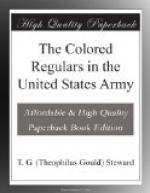The nation was, however, led into war simply to liberate Cuba from the iniquitous and cruel yoke of Spain, and to save thousands of impoverished Cubans from death by starvation. Great care was taken not to recognize the Cuban government in any form, and it seemed to be understood that we were to do the fighting both with our navy and our army, the Cubans being invited to co-operate with us, rather than that we should co-operate with them. We were to be the liberators and saviors of a people crushed to the very gates of death. Such was the platform upon which our nation stood before the world when the first orders went forth for the mobilization of its forces for war. It was a position worthy our history and character and gave to our national flag a prouder meaning than ever. Its character as the emblem of freedom shone out with awe-inspiring brilliancy amid the concourse of nations.
While there was such a clamor for war in the newspapers and in the public speeches of statesmen, both in and out of Congress, it is remarkable that the utmost serenity prevailed in the army. Officers and men were ready to fight if the stern necessity came, but they were not so eager for the death-game as were the numerous editors’ whose papers were getting out extras every half-hour. It was argued by the officers of rank that the Maine incident added nothing whatever to the Cuban question; that it did not involve the Spanish Government; that the whole subject might well be left to arbitration, and full respect should be given to Spain’s disclaimer. It was also held that to rush into a war in order to prevent a few people from starving, might not relieve them, and at the same time would certainly cost the lives of many innocent men. Spain was revising her policy, and the benevolence of the United States would soon bring bread to the door of every needy Cuban. Such remarks and arguments as these were used by men who had fought through one war and were ready to fight, through another if they must; but who were willing to go to any reasonable length to prevent it; and yet the men who used such arguments beforehand and manifested such a shrinking from carnage, are among those to whom the short Spanish War brought distinction and promotion. To their honor be it said that the war which gave them fresh laurels was in no sense brought about through their instigation.
As chaplain of the Twenty-fifth Infantry, stationed with the headquarters of the regiment at Fort Missoula, where we had been for ten years, the call for the war met me in the midst of my preparations for Easter service. One young man, then Private Thomas C. Butler, who was practicing a difficult solo for the occasion, before the year closed became a Second Lieutenant, having distinguished himself in battle; the janitor, who cared for my singing books, and who was my chief school teacher, Private French Payne, always polite and everywhere efficient, met his death from a Spanish bullet while on the reserve before bloody El Caney.




